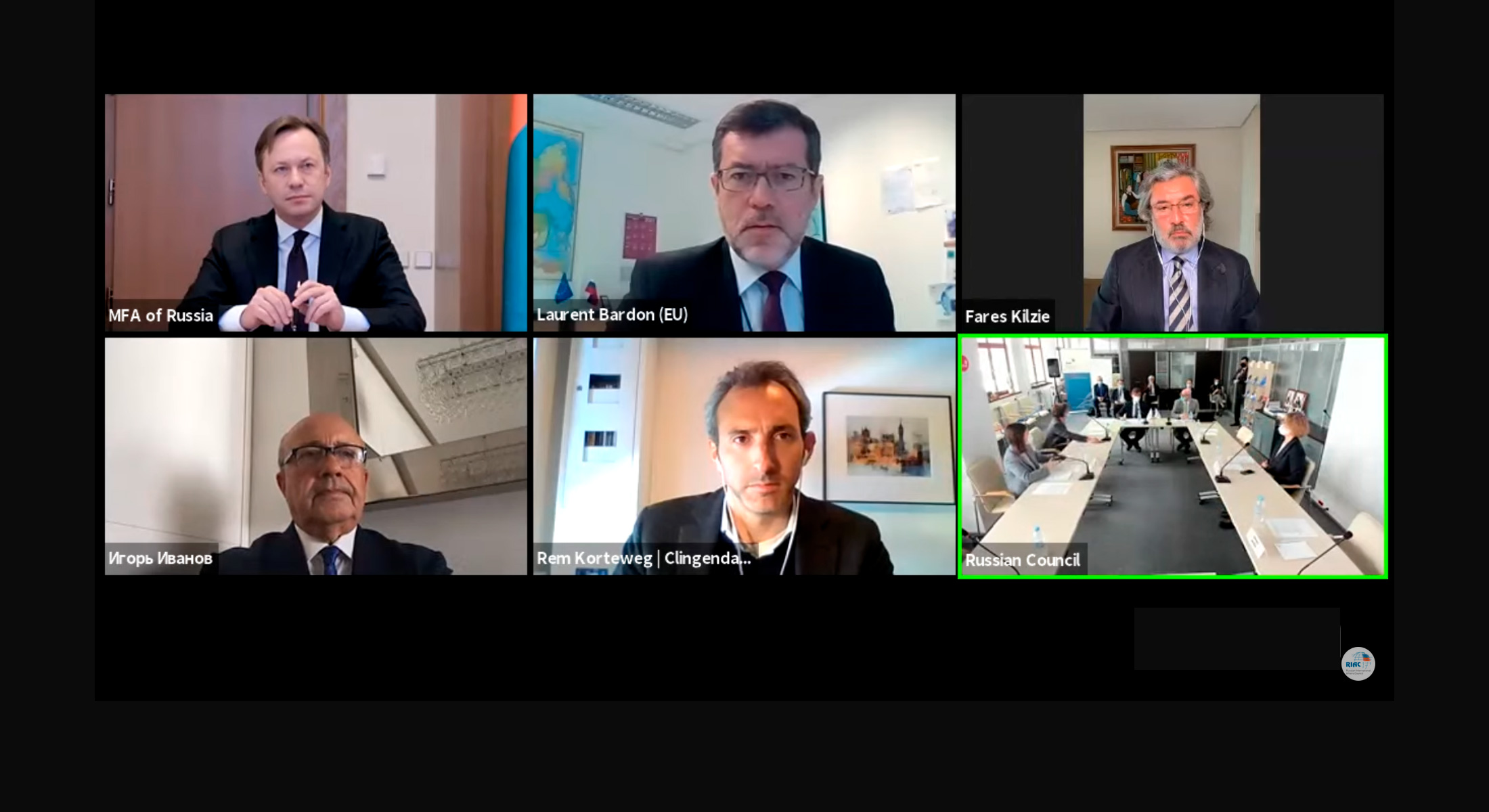On April 16, 2021, Russian International Affairs Council (RIAC) and CREON Group hosted an international expert seminar on “Prospects for cooperation between Russia and the EU in the ecology sphere”. Diplomats, experts, academics, and business operatives debated the European “Green Deal”, its risks and opportunities for the relations between Russia and the EU, as well as the impact of the EU Carbon Border Adjustment Mechanism (CBAM) for bilateral trade.
In an interview for RIAC, Fares Kilzie, Chairman of the Board of Directors of CREON Group and RIAC member, pledges to transform the EU-branded “Green Deal” into a Eurasian project. Only a common cross-continental approach would ensure the efficient implementation of decarbonization measures, which are of global rather than regional dimensions. Furthermore, joint efforts to combat climate change would bring the European Union and Eurasia, including Russia, closer.
On April 16, 2021, Russian International Affairs Council (RIAC) and CREON Group hosted an international expert seminar on “Prospects for cooperation between Russia and the EU in the ecology sphere”. Diplomats, experts, academics, and business operatives debated the European “Green Deal”, its risks and opportunities for the relations between Russia and the EU, as well as the impact of the EU Carbon Border Adjustment Mechanism (CBAM) for bilateral trade.
In an interview for RIAC, Fares Kilzie, Chairman of the Board of Directors of CREON Group and RIAC member, pledges to transform the EU-branded “Green Deal” into a Eurasian project. Only a common cross-continental approach would ensure the efficient implementation of decarbonization measures, which are of global rather than regional dimensions. Furthermore, joint efforts to combat climate change would bring the European Union and Eurasia, including Russia, closer.
How will the Green Deal and the Carbon Border Adjustment Mechanism (CBAM) affect Russian business?
Over the past five years, Russia has launched quite a few initiatives targeting the decarbonization of its economy. In late 2019, the Paris Agreement has been ratified, with Russia committed to it since 2016. The Russian law “On limiting greenhouse gas emissions” passed its second reading in the State Duma and will be adopted soon, while a pilot project creating the mechanism for carbon trading units has been introduced in the Sakhalin region.
Being successful with global decarbonization will remain to be the main challenge for the world economy in the 21st century. Russia’s growth will highly depend on how successful the country is in terms of CO2-reduction. This inevitable trend has been underlined by CREON Group for years: Back in 2014, almost six years prior to Russia joining the Paris Agreement, the group started to conduct with WWF Russia the rating of oil & gas business in Russia and CIS countries regarding their environmental responsibility. This annual “Rational Approach” Environmental Transparency Rating of Oil and Gas Companies laid the ground for a comprehensive observation of how oil and gas companies as the backbone of the Russian economy implement ESG standards and how they manage environmental challenges. Over the course of years, the Rating has raised the environmental responsibility and transparency of the oil and gas industry to a new quality level; this process began six years before the Green Deal was adopted.
How should Russia react to the EU Green Deal and the upcoming introduction of CBAM?
Strategically, the Green Deal is the best initiative of the European Union since the introduction of the Euro currency. Brussels has set the framework conditions for the development of full-fledged cooperation between the EU countries and its trading partners in the entire world. Combating climate change is a global goal that unites Russia and Germany, Kazakhstan and Portugal, the Netherlands and Belarus. Every step in this direction should contribute to overcoming political discord and to the development of genuinely mutual beneficial cooperation aside from sanctions and accusations.
We believe that Russia must and will follow the EU on this pathway towards a decarbonized world economy. Moscow stands ready to be an active participant in the EU's Green Deal, and develop it together on equal terms with the European partners, starting with Germany, where the green approach is a priority.
However, the Green Deal was developed in the upper corridors of the Brussels bureaucracy, which could easily be misunderstood. If the Green Deal is set as an entirely “European brand”, being implemented downwards as a unilateral solution, some countries could refuse to support it. The consequences concern not only the EU member states (EU-27), but the global economy: Thus, we recommend that the Green Deal must be elaborated on more deeply, coined as an “Eurasian project”, aligned by the EU with other continents as well.
Given this broader definition of the Green Deal, it can change the balance of power in the world market, making the global landscape greener. The European Union should pay close attention to the geostrategic component of the Green Deal and comprehend its impact on Russia as its energy partner, acknowledging the need to collaborate. In other words, for the European Green Deal to win success, it must become the Eurasian Green Deal. Neither sanctions nor penalties can be applied to green financing instruments, and green finance should become a priority in the relations between Russia and the European Union.
What are the risks of CBAM for the Russian business?
We are very deeply involved in the topic of cross-border carbon regulation which dates back to 2005, when the European Union launched the first international emissions trading system (EU ETS).
Until now, the CBAM mechanism has not fully been formulated and is being discussed by the EU. We recommend joining the discussion process and shaping the mechanism of the upcoming CBAM together. Due to the lack of knowledge in CBAM details, Russian companies may misinterpret the current situation. This could end up in legal actions against the introduction of the carbon tax on WTO level, which might at least delay the implementation.
We believe that the high risks and costs associated with the carbon tax should be shared by Russia with all of its close trading partners: with the EU, with members of the Eurasian Union, the Shanghai Cooperation Organization and other influential transnational institutions, through import and export tariff mechanisms based on the “One for all and all for one” principle.
At the same time, cross-border carbon tax forms a positive impetus for Russia and its partners, since it sets the pace and incentives for producers and exporters of carbon-intensive products. For example, for them to focus on low-emission products including first of all hydrogen of any type which Russia can supply to the EU and to the entire Eurasia.
What are the challenges and opportunities in the relations between Russia and the EU, as well as Russian and European businesses in the field of ecology and climate?
If the European Green Deal is transformed into an Eurasian Green Deal, this will open up huge prospects for cooperation between the European Union and Russia, its main ally in combating a common global enemy, which is climate change.
Should Russia aspire to achieve carbon-neutral economy, and how?
Considering the national interests and specifics, it is definitely worth it. Moving towards a carbon-neutral economy is the inevitable direction for both Europe and Eurasia. The entire world is striving for carbon neutrality. The mechanisms of an internal carbon tax or CO2 emissions trading will be introduced by all industrialized countries in the near future, without exception. This process was started by Europe, the United States and China. India, Africa and Latin America will follow soon.
Russia is ready to participate in this process on fair and equal terms. CREON Group is ready to contribute to this process. Decarbonization of the global economy is impossible without participation of Russia, just as it was impossible to reduce nuclear weapons until the USSR signed the Nuclear Weapons Non-Proliferation Treaty back in 1969.






